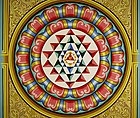This article needs additional citations for verification. (August 2024) |
| Hinduism and other religions |
|---|
 |
| Indian religions |
| Abrahamic religions |
| Hinduism and... |
| Part of a series on |
| Buddhism |
|---|
 |
Buddhism and Hinduism have common origins in the culture of Ancient India. Buddhism arose in the Gangetic plains of Eastern India in the 5th century BCE during the Second Urbanisation (600–200 BCE).[1] Hinduism developed as a fusion[2][note 1] or synthesis[3][note 2] of practices and ideas from the ancient Vedic religion and elements and deities from other local Indian traditions.[3][note 3]
Both religions have many shared beliefs and practices, but also pronounced differences that have led to much debate.[4] Both share belief in karma and rebirth (or reincarnation), they both accept the idea of spiritual liberation (moksha or nirvana) from the cycle of reincarnation and they both promote similar religious practices (such as dhyana, samadhi, mantra, and devotion). Both religions also share many deities (though their nature is understood differently), including Saraswati, Vishnu (Upulvan), Mahakala, Indra, Ganesha, and Brahma.
However, Buddhism notably rejects fundamental Hindu doctrines such as atman (substantial self or soul), Brahman (a universal eternal source of everything) and the existence of a creator God (Ishvara). Instead, Buddhism teaches not-self (anatman) and dependent arising as fundamental metaphysical theories.
- ^ Samuel 2010.
- ^ Lockard 2007, p. 50.
- ^ a b Hiltebeitel 2007, p. 12.
- ^ Y. Masih in A Comparative Study of Religions (2000), Motilal Banarsidass Publishers: Delhi, ISBN 81-208-0815-0 Page 18. "There is no evidence to show that Jainism and Buddhism ever subscribed to vedic sacrifices, vedic deities or caste. They are parallel or native religions of India and have contributed much to the growth of even classical Hinduism of the present times."
Cite error: There are <ref group=note> tags on this page, but the references will not show without a {{reflist|group=note}} template (see the help page).